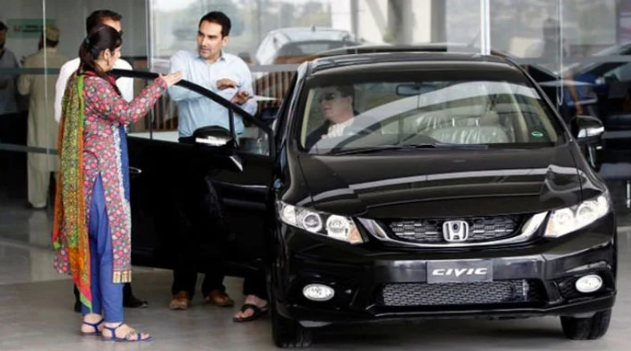High-interest rates and inflation continue to exert pressure on the auto finance sector, with auto loans falling by 23.5% year on year to Rs264 billion in October. This marks the 16th consecutive month of decline, as reported by The News citing data from the State Bank of Pakistan (SBP).
The central bank's data reveals a 3% month-on-month decrease from Rs272 billion in September, highlighting the persistent challenges faced by the auto finance sector. Auto loans, which reached a peak of Rs368 billion in June 2022, have since plummeted by 28% or Rs104 billion, attributing this decline to the SBP's efforts in tightening monetary policy to address inflation and external imbalances.
Analysts emphasize that the SBP's measures, including higher interest rates and currency devaluation, have significantly increased the cost of car financing and, subsequently, car prices. This has rendered them unaffordable for a substantial portion of consumers, especially considering the sharp increase in inflation, negatively impacting purchasing power.
The auto sector, grappling with high-interest rates and currency devaluation, faces challenges as some car makers attempt to alleviate the situation by reducing prices. However, the expected surge in demand has not materialized, as consumers continue to combat high inflation and dwindling disposable income.
Pakistan Automotive Manufacturers Association (PAMA) reports a 44% decline in car sales, amounting to 27,163 units in the first four months of the current fiscal year, which began in July.
The SBP, having raised its policy rate by a cumulative 15 percentage points to 22% since September 2021, currently boasts one of the highest rates globally. Projections suggest a potential easing of monetary policy by the first half of 2024, as inflationary pressures are anticipated to diminish, and foreign inflows are expected to improve the country's external position.
Recent data from the SBP indicates that bank loans to the private sector experienced a 0.8% decline in October, amounting to Rs8.10 trillion. Similarly, consumer loans dropped by 8% to Rs829 billion in October, with personal loans falling by 4% to Rs246 billion, and housing loans decreasing by 2.7% to Rs207 billion.
Analysts foresee a potential pickup in credit to the private sector in the coming months. This optimism is fueled by expectations of declining interest rates, fiscal consolidation reducing crowding out, and improved liquidity due to anticipated foreign inflows.
Stay tuned for updates on this evolving economic situation. #AutoLoans #EconomicChallenges #InflationImpact

